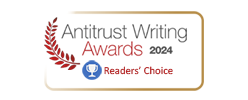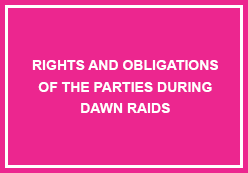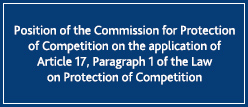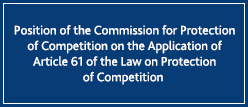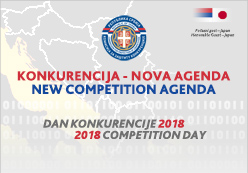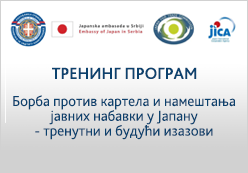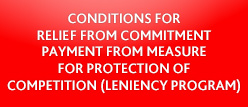The goal of competition protection is to create conditions for free market initiative, to prevent the restriction or elimination of competition between undertakings, and to ensure that companies do not behave in an illegal manner.
Protection of competition (protects competition as a state and process in the market) is different from the prevention of unfair competition (the protection of one company against the actions of another company).
Competition protection rules apply to all branches of the economy and to all entities that participate in the trade of goods and services in the Republic of Serbia, which is why it is important for businesses to comply with these rules.
The previous practice of the Commission for the Protection of Competition has shown that there is insufficient awareness among undertakings about the need and ways to align business conduct with competition rules. In addition, competition infringements often occur due to insufficient knowledge and ignorance of the obligations of undertakings in this area. In order to improve compliance with competition protection rules among undertakings, the Commission for the Protection of Competition adopted:
Frequently asked questions related to compliance programs
1. What is a compliance program and what is it used for?
A compliance program is an internal act of the company that helps the company comply with rules and regulations (on competition protection) in conducting business. These programs contribute to reducing and/or eliminating risks and avoiding “bad” business moves in order to ensure the long-term “healthy” business of the company.
2. What are the penalties if the company does not have a compliance program?
If the Commission determines the existence of a competition infringement, it imposes a measure of competition protection that amounts to a maximum of 10% of the total annual revenue generated on the territory of the Republic of Serbia.
Compliance programs can help prevent competition infringements from occurring, and thus the imposition of this measure.
There is no special sanction if the company does not have a business compliance program.
3. Who implements the compliance program and does it require a special permit?
Any undertaking (companies, associations, anyone participating in the trade of goods and services) can adopt a compliance program, and the Commission has prepared materials to help undertakings adopt and implement the program.
4. Is the compliance program submitted to anyone for approval?
No, this is an internal act of the company that serves to help management and employees avoid infringing competition rules.
5. Does the Commission check whether companies have a compliance program and whether they are written in accordance with the law?
No, the existence of these programs is voluntary and serves to reduce and eliminate the risks of competition infringements. There is no mandatory form or mandatory content prescribed by law, but the guidelines and template contain the Commission’s recommendations, formed on the basis of previous experience.
7. Is a compliance program mandatory?
No, but it helps business and can reduce the risks of competition infringements, and thus the determination of competition protection measures.
8. Is the template of the compliance program published by the Commission a mandatory form?
The template compiled by the Commission is given as an example and does not represent a mandatory form, but only a proposal that should assist and guide undertakings who decide to create their own compliance program to implement this idea and implement the compliance program in practice.
9. Can only an authorized person in the company commit an infringement of competition?
There is no rule as to who in the company can cause a competition infringement, which is why it is necessary to educate as many people as possible within the company about the risks and ways to avoid these risks.
Certain competition infringements are made by undertakings through strategic decisions, and this is most often the case with the abuse of a dominant position. Other infringements such as restrictive agreements in the form of exchange of commercially sensitive information may arise as a consequence of the actions of any of the employees.
10. Who should go through competition protection training in the company?
It is not possible to determine in advance, in a general way, the persons who can cause competition infringements, and therefore neither the persons who should be familiar with protection competition rules. This depends on the organization of the specific company. For example, these can be persons who make commercial decisions, persons who have any communication with competitors, persons who are in charge of public procurement.
11. Is there a special exam, license or certificate for someone to be in charge of implementing a competition compliance program in the company?
No special exam, license or certificate is required, but a good knowledge of competition protection rules is necessary. The guidelines contain the basic framework of competition rules and refer to the existing legal framework and useful sources of data.
